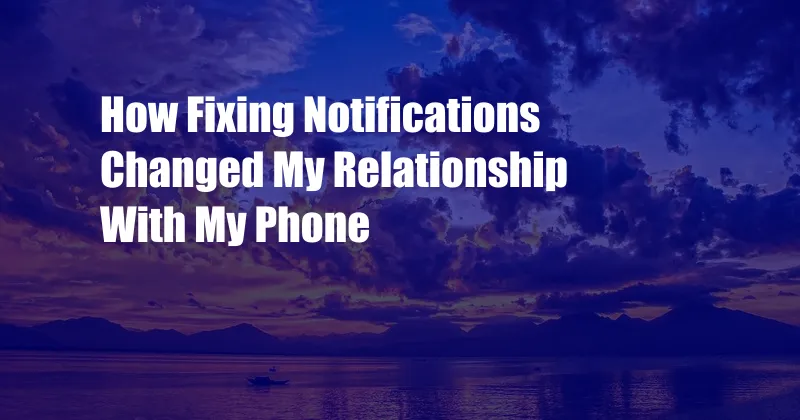
How Fixing Notifications Changed My Relationship with My Phone
My phone buzzed incessantly, demanding my attention. Emails, text messages, social media updates – a never-ending stream of notifications. I felt an irresistible urge to respond, my fingers automatically reaching for the screen. My phone had become a constant distraction, interrupting conversations, meals, and even my sleep. I knew something had to change.
Out of desperation, I decided to experiment with disabling notifications. The result? A profound shift in my relationship with my phone. In this article, I’ll share my experience, exploring how disabling notifications can transform your digital habits and improve your overall well-being.
Reclaiming Control over Your Time
With notifications constantly bombarding me, I felt like I was constantly on call. I lost track of time, spending countless hours scrolling through my phone, responding to messages, and checking updates. By disabling notifications, I took back control over my time. I could now focus on the present moment, actively choosing when and how I wanted to engage with my phone.
It wasn’t easy at first. I found myself reaching for my phone out of habit, but without the notifications, there was nothing to distract me. Gradually, I rewired my brain to recognize that I didn’t need to check my phone every few minutes. I became more mindful of my phone usage, setting aside specific times for checking my messages and emails, and focusing on other activities during the rest of my day.
Improving Focus and Productivity
Disabling notifications not only freed up my time but also significantly improved my focus and productivity. When my phone was constantly vying for my attention, it was difficult to concentrate on anything else. Now, with notifications silenced, I could immerse myself in my work, hobbies, and conversations without distractions. I found myself accomplishing more in less time, and my overall quality of work improved.
Research supports this finding. A study by the University of California, Irvine, revealed that participants who received less frequent notifications performed better on cognitive tasks, such as reading comprehension and problem-solving. The study concluded that notifications can impair cognitive function by diverting attention away from the present task.
Reducing Stress and Anxiety
The constant stream of notifications can create a sense of urgency and overwhelm. Every buzz or vibration triggers a fear of missing out, contributing to feelings of stress and anxiety. By disabling notifications, I eliminated this constant source of low-level stress. I no longer felt compelled to respond to every message or update immediately.
This had a noticeable impact on my mental well-being. I felt calmer and more relaxed throughout the day, and my sleep improved as well. The absence of notifications allowed me to unwind and disconnect from the digital world, promoting a more restful night’s sleep.
Tips and Expert Advice
Transitioning to a notification-free lifestyle can be challenging, but it’s well worth the effort. Here are a few tips and expert advice to help you make the switch:
- Start gradually: Don’t disable all notifications at once. Start by turning off notifications for non-essential apps.
- Identify your triggers: Pay attention to the type of notifications that distract you the most and disable those first.
- Set aside specific times for checking: Schedule specific intervals throughout the day to check your phone for messages and updates.
- Unplug before bed: Avoid using your phone for at least an hour before going to sleep to promote better sleep.
- Use apps to manage notifications: There are apps available that allow you to customize your notifications and reduce distractions.
Remember that it takes time and effort to change your digital habits. Don’t be discouraged if you slip up occasionally. Simply remind yourself of the benefits and keep practicing until it becomes second nature.
FAQs
- Q: Will I miss important messages if I disable notifications? A: It’s unlikely. Most essential messages, such as phone calls, text messages from family and friends, and urgent work emails, will still come through.
- Q: How do I know if I’m addicted to my phone? A: Signs of phone addiction include excessive use, difficulty controlling usage, and negative consequences on your daily life.
- Q: What are some alternative ways to stay informed without notifications? A: You can set aside daily time slots to check your messages and emails, or use a dedicated news app for updates.
- Q: Will disabling notifications affect my social media engagement? A: You may see a slight decrease in engagement, but it’s an opportunity to engage with your followers more intentionally.
Conclusion
Disabling notifications was a transformative experience for me. It empowered me to take back control over my time, improve my focus and productivity, and reduce stress and anxiety. If you’re feeling overwhelmed by the constant buzz of notifications, I encourage you to give it a try. You may be surprised at how much it improves your relationship with your phone and your overall well-being.
Are you ready to improve your digital habits and embark on a more mindful approach to your phone usage?